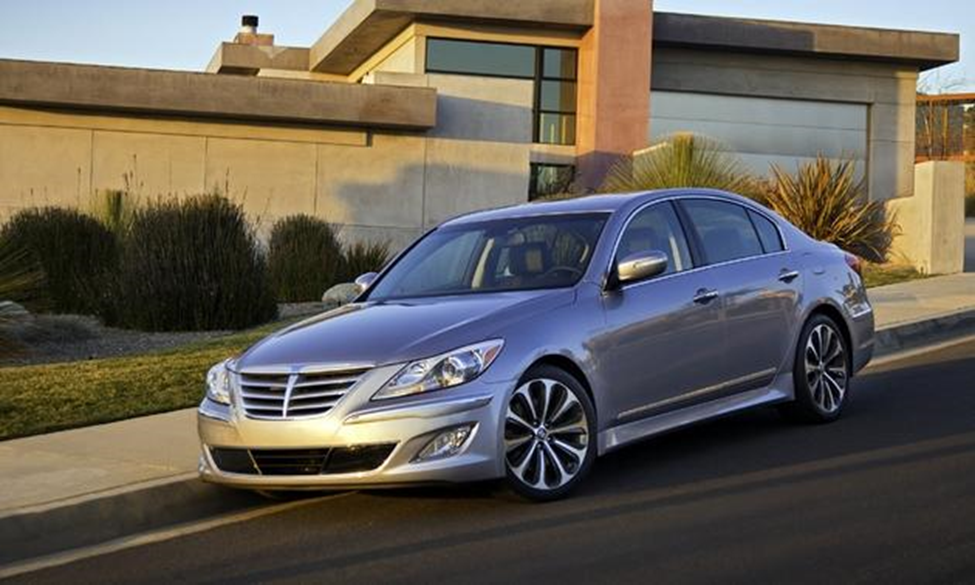The devil, again, is in the details: The interior materials overall are exceptional but the car smells inexpensive. Crazy, perhaps, but when I get in the Genesis, I see Mercedes-Benz and smell 1987 Excel. It matters. Similarly, a couple of random touchpoints reveal cost-cutting. The panel holding the electric steering-wheel adjuster is made of the most inexpensive plastic I’ve ever felt, made more obvious by its placement adjacent to a luxury feature. The pedals still feel flexible and plasticky underfoot, and screw holes on the back of the steering wheel fall just at the spot the driver’s middle fingers rest when holding the wheel.
My overall impression is that the R-spec Genesis sedan is what the regular Genesis sedan should feel like. There’s no aggressive tuning going on here; it simply brings the Genesis up to a level approximating the German midsize-sedan offerings.
Those looking for a BMW M or a Mercedes-Benz AMG competitor will find nothing of interest in the Genesis sedan R-Spec. But those seeking a competent near-luxury car for less than $50,000 might find this car makes a compelling case.
SENIOR MOTORSPORTS EDITOR MAC MORRISON: This is probably the best Hyundai, overall, I’ve seen or driven. Sharp German-esque styling (I see a little Infiniti in some of the details as well), a low stance, 19-inch Bridgestones filling the wheel arches, and nice luxury details such as the illuminated “Genesis” logo on the kick plates make for a sharp-looking midsize sedan that comes with a strong list of standard equipment. Good luck trying to find a similarly outfitted BMW or Mercedes for less than $50,000.
The Genesis is comfortable, with a good driving position and well-designed seats. The interior design is well conceived (and clearly lifted from Mercedes), and the execution lacks in places. Some of the controls and switches, especially the rotary knob that controls the multimedia interface, feel quite flimsy and inexpensive, and some of the leather trim feels more like pleather than cowhide.
The actual driving? Rather mundane, frankly. Don’t let the “R-Spec” designation and what it implies raise your expectations into the sport-sedan realm, because you’ll be disappointed. As Andy mentioned, all Genesis models should be set up this way, and I’m disappointed that Hyundai elected to waste an “R” badge on a setup that is simply pedestrian. The ride and handling package doesn’t do anything to scream “dynamic,” and there is a boatload of bodyroll when you attack curves. I hustled the car around a freeway ramp and its behavior made me say out loud, “Oh, I see you don’t like that, Genesis . . . OK.”
I’m not throwing the R-Spec’s responses under the bus, because it’s perfectly well-sorted for “normal” driving. It just doesn’t deliver a sport-sedan experience or feel anywhere near as tight as its upscale competition.
The engine is a strong point, with impressive power and torque; I’m not a fan of its “whiny” sound, though. This does not quite deliver the noise you probably expect from a V8, but the car accelerates strong and cruises quietly, two critical factors for a real-world luxury experience. The transmission, however, is slow to respond to throttle input during “kickdown” situations; Hyundai’s powertrain people need to improve this.
The overwhelming theme here is that the Genesis R-Spec offers a hell of a lot to like, both inside and out. Just don’t get into it expecting BMW-like reflexes.



